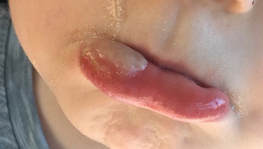
- You, as the child’s parent/legal guardian, must remain at the office throughout the sedation appointment. Please don’t leave the office for any reason.
- The doctor and staff will evaluate your child’s health status before he/she will be discharged home. Children recover from effects of sedatives at different rates so be prepared to remain at our office until the doctor has determined your child is stable and the after-effects are minimal.
- At discharge, your child should be responsive but may be drowsy, crying, or fussy.
After the sedation appointment:
• Once home, your child will still be drowsy and must remain under adult supervision until fully recovered from the effects of the sedation. If your child wants to sleep, position your child on his/her side with the head supported and the chin up. During this period, check your child’s breathing and airway every five minutes. If your child is snoring, reposition the head until the snoring disappears and your child breathes normally. If breathing becomes abnormal or you are unable to arouse your child, contact emergency services immediately.
• Nausea and vomiting are occasional side effects of sedation. If vomiting occurs, immediately clear the material from your child’s mouth. If vomiting persists for 20 to 40 minutes, contact our office immediately.
• Your child may be drowsy for some time after the sedation appointment. Restrict activities for the remainder of the day. Prohibit potentially harmful activities such as bike riding, swimming, using playground equipment, or any activity where balance is important.
• In addition to the sedative medications, we use local anesthetic to numb the mouth during dental treatment. The numbness usually lasts two to four hours. Watch to see that your child does not bite, scratch, or injure the cheek, lips, or tongue during this time:

• Children may be irritable after treatment. If this occurs, stay with your child and provide a calm environment. If you believe the irritability is caused by discomfort, you may give your child acetaminophen (Tylenol®) or ibuprofen (Motrin®, Advil®). Follow the instructions on the bottle for dosing based upon your child’s age/weight.
• Once your child is alert, you may give him/her sips of clear liquids to prevent nausea and dehydration. Small drinks taken repeatedly are preferable to large amounts. The first meal should be something light and easily digestible (e.g., soup, Jell-O®, apple sauce). Do not give fatty or spicy foods (e.g., French fries, tacos, salsa, milk, cheese, yogurt).
• A slight fever (temperature to 100.5°F) is not uncommon after sedation. You may give your child acetaminophen (Tylenol®) or ibuprofen (Motrin®, Advil®). Follow the instructions on the bottle for dosing based upon your child’s age/ weight. Because dehydration may cause a slight increase in temperature, clear fluids may help correct this condition. If a higher fever develops or the fever persists, call our office.
• Please feel free to call the office for any questions or concerns you might have. If you have any questions after hours, please call Dr Libby on her cell at (480) 221-8933
Trusting us with your child care means so much to us. We will treat them as if they were our own.
We Love 2 Love you!
For your convenience you can also download this information in PDF format:
